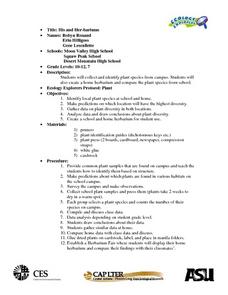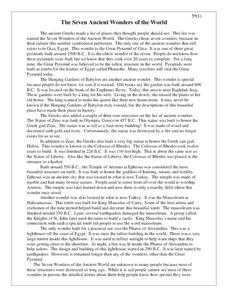Curated OER
Specialized for the Sea
Students use pictures and make a mural to investigate how ocean animals are adapted to certain parts of their environment.
Curated OER
Agriculture: Oklahoma's Legacy
Sixth graders explore agriculture as it relates to crops over the course of a series of historical events. They read and create a timeline of the 50-year increments that depict important cause and effect events. Students then use...
Curated OER
Ecosystems and Remote Sensing
Students obtain remote sensing data to compare and contrast global biomass data with global temperature data.
Curated OER
Language Arts: Ode to the Ordinary
Eighth graders select ordinary objects, determine their uses, and write poems about them. Once they select an object, they create a web about its uses to serve as an outline. Once they have written their own odes, 8th graders meet in...
American Museum of Natural History
What's the Big Deal About Water?
It may seem simple, but water is one of the most unique substances on Earth. An interactive online lesson describes its properties and importance in so many different situations. Learners interact with the lesson to learn the role water...
K12 Reader
The Grand Canyon
After reading s short description of the Grand Canyon, readers demonstrate their ability to use context to determine the meaning of words in the passage.
Calvin Crest Outdoor School
Survival
Equip young campers with important survival knowledge with a set of engaging lessons. Teammates work together to complete three outdoor activities, which include building a shelter, starting a campfire, and finding directions in the...
Curated OER
Whose Home Is This?
After reading a short and informative paragraph on animals and their environments, learners look at pictures of four animals, and write a short description of how each one has adapted to its environment. A suggested activity is that each...
National Wildlife Federation
What's Your Habitat?
How are third graders like rabbits? They both live in habitats and require food, water, and shelter to survive! An educational science lesson encourages your learners to think about their own habitats and survival needs, before comparing...
Curated OER
Science: Her-bariums Galore!
Young scholars collect and identify plant species and construct herbariums both at school and at home. By gathering data from both locales, they draw conclusions and make predictions about plant diversity. Upon completion of the...
K12 Reader
Taiga Ecosystems
Introduce your class to another type of ecosystem, the taiga ecosystem, through a reading passage. Class members read the text and then respond to five reading questions about the content of the passage.
Curated OER
The Prairie Climate
Ninth graders research the average temperature and precipitation of a prairie region to determine the type of climate it is, and how it differs from other biomes. They examine the types of adaptions animals have made to live in the...
Curated OER
Living in the Greenhouse
Students discuss the different types of climate zones found throughout the world. They participate in activities which relate to real events. They make observations and the consequences of their actions on the environment.
Curated OER
Visual Vocabulary
Students interpret and name the vocabulary termed acted out by the mime. In this science/language arts/physical education lesson plan, students are given a set of vocabulary terms to discuss within their group. Next, students place all...
K12 Reader
Taiga Ecosystems
After reading a short article about taiga ecosystems, middle schoolers are asked to identify the characteristics of this chilly environment.
University of Connecticut
Building Your Own Biosphere
On September 26, 1991, four women and four men entered the scientific experiment, Biosphere 2; the doors were sealed for two years in order to study the interactions of a biosphere. In the activity, scholars explore biospheres by...
American Museum of Natural History
What do you know about Biodiversity?
What do your classes know about biodiversity? A 10-question online quiz asks questions related to biodiversity and species groups. As learners answer questions, they click on links to additional information. The lesson could be an option...
American Museum of Natural History
Layer of Time
Dig through the layers for a better understanding of fossils. Scholars learn that fossils form in layers of sedimentary rock. Pupils arrange virtual layers to show the fossil record of different species. Once the layers are correct, they...
Curated OER
Exploring Biomes Lesson 5: You Need a Vacation
In cooperative groups, emerging ecologists research assigned biomes found in Arizona. Combining photos and facts, they use PowerPoint to produce a fully automated commercial that lasts 45 seconds. In addition to the lesson outline,...
Curated OER
From Yosemite to Joshua Tree
Fourth graders discover diversity of plant and animal life in California's parks and compare findings to identify what makes park areas unique. Students then publish their discoveries in picture books of their own design.
Curated OER
Water Uses and Children's Lives in East Africa
Students explore water usage around the world. In this "water" social studies lesson, students brainstorm ways in which water is used. Students visit the Water in Africa website to view pictures of water usage in Africa. Students...
Indian Land Tenure Foundation
Relationships to Places
Young historians take a look at how the Indian tribes of California promoted a mindful relationship between people and the land. They begin to understand how the Indians were champions of conservation, and at preserving the natural...
Brooklyn Museum
Fred Tomaselli
Kids will observe, write, and create as a way to better understand the work of artist Fred Tomaselli. Guided by great critical thinking questions, learners will first analyze the piece Field Guides. Then, they will write a creative...
Curated OER
The Seven Ancient Wonders of the World
Did you know only one of the Seven Wonders of the World still exists today? Here is a historical reading passage that provides readers with a brief history of the seven marvelous wonders.
Other popular searches
- Life Cycle Desert Plants
- Desert Plants Life
- Desert Plants Activity
- Desert Plants and Animals
- Worksheets on Desert Plants
- Namib Desert Plants
- Namibia Desert Plants
- Australian Desert Plants
- Evolution of Desert Plants
- Desert Plants Experiments
- Desert Plants and Medicine

























